introduction to asynchronous programming
with
python and twisted
self.who()
fabio sangiovanni
@sanjioh
I work with computers!
Backend Developer and DevOps Engineer
@MailUp
self.who()
fabio sangiovanni
@sanjioh
I work with computers!
Backend Developer and DevOps Engineer
@MailUp
My hobby is computers.
And travelling.
But, computers! <3
basic concepts
software properties
- CONCURRENCY
several tasks (units of work) can advance without waiting for each other to complete
-
PARALLELISM
concurrency with tasks executed simultaneously, literally at the same physical instant
basic concepts
OPERATING systems
- PROCESS
an instance of a computer program that is being executed
-
THREAD
-
part of a process (shares code and memory)
-
the smallest sequence of instructions that can be managed independently by the OS scheduler (e.g. runnable on a CPU core)
-
execution models
- an execution model defines how work takes place
- what is an indivisible unit of work?
- what is the order in which those units of work are executed?
execution models
- an execution model defines how work takes place
- what is an indivisible unit of work?
- what is the order in which those units of work are executed?
- fundamental stage of software design
- heavy impact on concurrency management
execution models
- an execution model defines how work takes place
- what is an indivisible unit of work?
- what is the order in which those units of work are executed?
- fundamental stage of software design
- heavy impact on concurrency management
- we will examine the following:
- single-threaded synchronous
- multi-threaded
- single-threaded asynchronous
execution models
- an execution model defines how work takes place
- what is an indivisible unit of work?
- what is the order in which those units of work are executed?
- fundamental stage of software design
- heavy impact on concurrency management
- we will examine the following:
- single-threaded synchronous
- multi-threaded
- single-threaded asynchronous
- let's now imagine our application needs to perform 3 tasks...
execution models
single-threaded synchronous
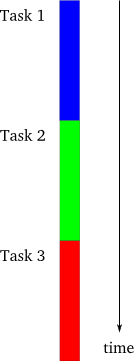
- one task performed at any given time
execution models
single-threaded synchronous

- one task performed at any given time
- each task starts after the previous has completely finished its job
execution models
single-threaded synchronous

- one task performed at any given time
- each task starts after the previous has completely finished its job
- task order allows a later task to assume no errors and available outputs from the earlier ones
execution models
single-threaded synchronous

- one task performed at any given time
- each task starts after the previous has completely finished its job
- task order allows a later task to assume no errors and available outputs from the earlier ones
- very simple, but no concurrency, no parallelism
code example
single-threaded synchronous
# python3
import requests
_WEBSITES = ('https://www.google.com', 'https://www.amazon.com',
'https://www.facebook.com')
def get_homepages():
homepages = {}
for website in _WEBSITES:
response = requests.get(website)
homepages[website] = response.text
return homepages
if __name__ == '__main__':
homepages = get_homepages()
for website in _WEBSITES:
print(homepages[website])
execution models
multi-threaded
- each task runs in a separate thread

execution models
multi-threaded
- each task runs in a separate thread
- threads are exclusively managed by the OS

execution models
multi-threaded
- each task runs in a separate thread
- threads are exclusively managed by the OS
- tasks run in parallel on multiple CPU cores
(on single core CPUs time slicing occurs)

execution models
multi-threaded
- each task runs in a separate thread
- threads are exclusively managed by the OS
- tasks run in parallel on multiple CPU cores
(on single core CPUs time slicing occurs) - concurrency and parallelism

code example
multi-threaded
# python3
import threading
import requests
_WEBSITES = ('https://www.google.com', 'https://www.amazon.com',
'https://www.facebook.com')
def _fetch(website, homepages):
response = requests.get(website)
homepages[website] = response.text # !!!
def get_homepages():
homepages = {}
threads = [threading.Thread(target=_fetch, args=(website, homepages))
for website in _WEBSITES]
for thread in threads: thread.start()
for thread in threads: thread.join()
return homepages
if __name__ == '__main__':
homepages = get_homepages()
for website in _WEBSITES: print(homepages[website])
but wait...
A typical scenario
in a PARALLEL WORLD
-
multiple threads within one process
but wait...
A typical scenario
in a PARALLEL WORLD
-
multiple threads within one process
-
...executing at the very same time
but wait...
A typical scenario
in a PARALLEL WORLD
-
multiple threads within one process
-
...executing at the very same time
-
...on one or more CPU cores
but wait...
A typical scenario
in a PARALLEL WORLD
-
multiple threads within one process
-
...executing at the very same time
-
...on one or more CPU cores
-
...communicating by resource sharing
(most notably: memory)
but wait...
A typical scenario
in a PARALLEL WORLD
-
multiple threads within one process
-
...executing at the very same time
-
...on one or more CPU cores
-
...communicating by resource sharing
(most notably: memory) -
...with no control over scheduling by the developer
what could possibly
go wrong?
what could possibly
go wrong?
(tl;dr: a lot)
threads
are
hard
here be dragons
multithreading programming is...
- hard to reason about
here be dragons
multithreading programming is...
- hard to reason about
- hard to actually get right
- communication and coordination between threads is an advanced programming topic
here be dragons
multithreading programming is...
- hard to reason about
- hard to actually get right
- communication and coordination between threads is an advanced programming topic
- hard to test
here be dragons
multithreading programming is...
- hard to reason about
- hard to actually get right
- communication and coordination between threads is an advanced programming topic
- hard to test
- ridden with perils
- deadlock
- starvation
- race conditions
here be dragons
multithreading programming is...
- hard to reason about
- hard to actually get right
- communication and coordination between threads is an advanced programming topic
- hard to test
- ridden with perils
- deadlock
- starvation
- race conditions
same applies to multiprocessing
here be dragons
multithreading programming is...
- hard to reason about
- hard to actually get right
- communication and coordination between threads is an advanced programming topic
- hard to test
- ridden with perils
- deadlock
- starvation
- race conditions
same applies to multiprocessing
"who's there?"
"race condition"
"knock, knock"
and in python...
"In CPython, the global interpreter lock, or GIL, is a mutex that prevents multiple native threads from executing Python bytecodes at once."
https://wiki.python.org/moin/GlobalInterpreterLock
"The GIL is controversial because it prevents multithreaded CPython programs from taking full advantage of multiprocessor systems in certain situations."
bonus!!!
Removing Python's GIL: The Gilectomy
https://www.youtube.com/watch?v=P3AyI_u66Bw
by Larry Hastings, core CPython committer

-- photo by Kenneth Reitz
So what?
single-threaded synchronous is not concurrent :(
multithreading is OMG NOPE!
do we really need to choose between
poor performance
and
programming pain?

execution models
SINGLE-THREADED aSYNCHRONOUS
- one task performed at any given time
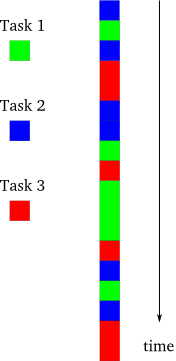
execution models
SINGLE-THREADED aSYNCHRONOUS
- one task performed at any given time
- tasks run in a single thread, but! they're interleaved with one another

execution models
SINGLE-THREADED aSYNCHRONOUS
- one task performed at any given time
- tasks run in a single thread, but! they're interleaved with one another
- a task will continue to run until it explicitly relinquishes control to other tasks
- the developer is back in control of task scheduling

execution models
SINGLE-THREADED aSYNCHRONOUS
- one task performed at any given time
- tasks run in a single thread, but! they're interleaved with one another
- a task will continue to run until it explicitly relinquishes control to other tasks
- the developer is back in control of task scheduling
- concurrency without parallelism!

but there's more...
SINGLE-THREADED aSYNCHRONOUS
- the model works best when tasks are forced to wait, or block
- typically to perform I/O
- network and disk are MUCH slower than the CPU!

but there's more...
SINGLE-THREADED aSYNCHRONOUS
- the model works best when tasks are forced to wait, or block
- typically to perform I/O
- network and disk are MUCH slower than the CPU!
- an asynchronous program will meanwhile execute some other task that can still make progress
- it's a non-blocking program

but there's more...
SINGLE-THREADED aSYNCHRONOUS
- the model works best when tasks are forced to wait, or block
- typically to perform I/O
- network and disk are MUCH slower than the CPU!
- an asynchronous program will meanwhile execute some other task that can still make progress
- it's a non-blocking program
- less waiting == more performance


mind = blown
the use case
- large number of tasks
- there is always at least one that can make progress
- lots of I/O
- a synchronous program would waste time blocking
- tasks are largely independent from one another
- no need for inter-task communication
- no task waits for others to complete
the use case
every modern
CLIENT-SERVER
NETWORK APPLICATION
ASYNCHRONOUS NETWORKING
THE RECIPE
ASYNCHRONOUS NETWORKING
THE RECIPE
non-blocking sockets
ASYNCHRONOUS NETWORKING
THE RECIPE
non-blocking sockets
a socket polling method
ASYNCHRONOUS NETWORKING
THE RECIPE
non-blocking sockets
a socket polling method
a loop
sockets
- abstractions of network endpoints
- you write into sockets to send data
- you read from sockets to receive data
sockets
- abstractions of network endpoints
- you write into sockets to send data
- you read from sockets to receive data
- by default sockets are in blocking mode
- operations on sockets don't return control to the program until complete
sockets
- abstractions of network endpoints
- you write into sockets to send data
- you read from sockets to receive data
- by default sockets are in blocking mode
- operations on sockets don't return control to the program until complete
- in non-blocking mode operations return immediately
-
socket.setblocking(False)
-
polling
- in non-blocking mode, operations fail if they cannot be completed immediately
polling
- in non-blocking mode, operations fail if they cannot be completed immediately
- the OS provides functions that can be used to know when a socket is available for I/O
polling
- in non-blocking mode, operations fail if they cannot be completed immediately
- the OS provides functions that can be used to know when a socket is available for I/O
- if none is available, they wait (block)
polling
- in non-blocking mode, operations fail if they cannot be completed immediately
- the OS provides functions that can be used to know when a socket is available for I/O
- if none is available, they wait (block)
- OS dependent implementations, e.g.
-
select()
-
epoll()
-
kqueue()
-
polling
- in non-blocking mode, operations fail if they cannot be completed immediately
- the OS provides functions that can be used to know when a socket is available for I/O
- if none is available, they wait (block)
- OS dependent implementations, e.g.
-
select()
-
epoll()
-
kqueue()
-
-
import select
a loop
well, it's a loop
nothing fancy to see here
while True:
do_stuff()
the reactor loop

- a loop
the reactor loop

- a loop
- ...that monitors a set of sockets
- in non-blocking mode
the reactor loop

- a loop
- ...that monitors a set of sockets
- in non-blocking mode
- ...and reacts when they are ready for I/O
- using an OS provided polling function
the reactor loop

- a loop
- ...that monitors a set of sockets
- in non-blocking mode
- ...and reacts when they are ready for I/O
- using an OS provided polling function
- also called event loop, because it
waits for events to happen
the reactor loop
- a loop
- ...that monitors a set of sockets
- in non-blocking mode
- ...and reacts when they are ready for I/O
- using an OS provided polling function
- also called event loop, because it
waits for events to happen

code example
import select
# sockets = [...]
# def do_reads(socks): ...
# def do_writes(socks): ...
while sockets:
r_sockets, w_sockets, _ = select.select(sockets, sockets, [])
closed_r_sockets = do_reads(r_sockets)
closed_w_sockets = do_writes(w_sockets)
for sock in closed_r_sockets + closed_w_sockets:
sockets.remove(sock)enter twisted
-
event-driven networking engine
- a framework to build asynchronous network applications (client and server)
enter twisted
-
event-driven networking engine
- a framework to build asynchronous network applications (client and server)
- implementation of the Reactor Pattern
enter twisted
-
event-driven networking engine
- a framework to build asynchronous network applications (client and server)
- implementation of the Reactor Pattern
- + Internet protocols
- SMTP, POP3, IMAP, SSHv2, DNS, etc.
- + Internet protocols
enter twisted
-
event-driven networking engine
- a framework to build asynchronous network applications (client and server)
- implementation of the Reactor Pattern
- + Internet protocols
- SMTP, POP3, IMAP, SSHv2, DNS, etc.
- + abstractions to build custom protocols
- + Internet protocols
enter twisted
-
event-driven networking engine
- a framework to build asynchronous network applications (client and server)
- implementation of the Reactor Pattern
- + Internet protocols
- SMTP, POP3, IMAP, SSHv2, DNS, etc.
- + abstractions to build custom protocols
- + utilities to make your async life easier
- + Internet protocols
enter twisted
-
event-driven networking engine
- a framework to build asynchronous network applications (client and server)
- implementation of the Reactor Pattern
- + Internet protocols
- SMTP, POP3, IMAP, SSHv2, DNS, etc.
- + abstractions to build custom protocols
- + utilities to make your async life easier
- + Internet protocols
- written in Python
enter twisted
-
event-driven networking engine
- a framework to build asynchronous network applications (client and server)
- implementation of the Reactor Pattern
- + Internet protocols
- SMTP, POP3, IMAP, SSHv2, DNS, etc.
- + abstractions to build custom protocols
- + utilities to make your async life easier
- + Internet protocols
- written in Python
- cross-platform

enter twisted
- originally written by Glyph Lefkowitz, still project lead

enter twisted
- originally written by Glyph Lefkowitz, still project lead
-
first release in 2002
- initial use case was a large multiplayer game

enter twisted
- originally written by Glyph Lefkowitz, still project lead
-
first release in 2002
- initial use case was a large multiplayer game
- open source
- MIT license

enter twisted
- originally written by Glyph Lefkowitz, still project lead
-
first release in 2002
- initial use case was a large multiplayer game
- open source
- MIT license
- runs on CPython 2.7 and PyPy
- porting to CPython 3.3+ is in progress!

enter twisted
- originally written by Glyph Lefkowitz, still project lead
-
first release in 2002
- initial use case was a large multiplayer game
- open source
- MIT license
- runs on CPython 2.7 and PyPy
- porting to CPython 3.3+ is in progress!
- https://github.com/twisted/twisted

enter twisted
Twisted solves C10K on a common laptop

enter twisted
Twisted solves C10K on a common laptop
compare this with a threaded implementation:
assuming 128KB/thread of stack size,
~1.3GB memory overhead
(let alone the required context switching)

baby steps
# python3
from twisted.internet import reactor
reactor.run()
# absolutely nothing happensbaby steps
# python3
from twisted.internet import reactor
reactor.run()
# absolutely nothing happens- Twisted’s reactor loop needs to be imported and explicitly started
baby steps
# python3
from twisted.internet import reactor
reactor.run()
# absolutely nothing happens- Twisted’s reactor loop needs to be imported and explicitly started
- it runs in the same thread it was started in
baby steps
# python3
from twisted.internet import reactor
reactor.run()
# absolutely nothing happens- Twisted’s reactor loop needs to be imported and explicitly started
- it runs in the same thread it was started in
- if it has nothing to do, it will stay idle, without consuming CPU
- it's not a busy loop
do something!
# python3
from twisted.internet import reactor
def hello():
print('I like turtles')
reactor.callWhenRunning(hello)
print('Starting the reactor')
reactor.run()
# Starting the reactor
# I like turtlescallbacks
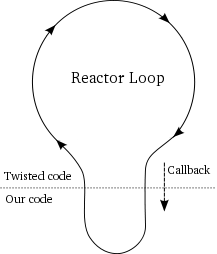
- Twisted provides the reactor loop
callbacks

- Twisted provides the reactor loop
- we provide the business logic to do something useful
callbacks

- Twisted provides the reactor loop
- we provide the business logic to do something useful
- the reactor loop controls the thread it runs in, and will call our code
callbacks

- Twisted provides the reactor loop
- we provide the business logic to do something useful
- the reactor loop controls the thread it runs in, and will call our code
- a callback is a function that we give to Twisted and that the reactor will use to "call us back" at the right time
callbacks

- our callback code runs in the same thread as the Twisted loop
callbacks

- our callback code runs in the same thread as the Twisted loop
- when our callbacks are running, the Twisted loop is not running
- be careful not to block!
callbacks

- our callback code runs in the same thread as the Twisted loop
- when our callbacks are running, the Twisted loop is not running
- be careful not to block!
- and vice versa
callbacks

- our callback code runs in the same thread as the Twisted loop
- when our callbacks are running, the Twisted loop is not running
- be careful not to block!
- and vice versa
- the reactor loop resumes when our callback returns
stopping
# python3
from twisted.internet import reactor
def hello():
print('I like turtles')
def stop():
reactor.stop()
reactor.callWhenRunning(hello)
reactor.callWhenRunning(stop)
print('Starting the reactor')
reactor.run()
print('Reactor stopped')
# Starting the reactor
# I like turtles
# Reactor stoppedok, slow down
since these programs don't use sockets at all, why don't they get blocked in the
select()
call?
OK, SLOW DOWN
since these programs don't use sockets at all, why don't they get blocked in the
select()
call?
- because it also accepts an optional timeout value
OK, SLOW DOWN
since these programs don't use sockets at all, why don't they get blocked in the
select()
call?
- because it also accepts an optional timeout value
- if no sockets* have become ready for I/O within the specified time then it will return anyway
- a timeout value of zero allows to poll a set of sockets without blocking at all
*more accurately, file descriptors
exceptions
# python3
from twisted.internet import reactor
def error():
raise Exception('BOOM!')
def back():
print('Aaaand we are back!')
reactor.stop()
reactor.callWhenRunning(error)
reactor.callWhenRunning(back)
print('Starting the reactor')
reactor.run()
# Starting the reactor
# Unhandled Error
# Traceback (most recent call last):
# ...
# builtins.Exception: BOOM!
# Aaaand we are back!exceptions
- the second callback runs after the traceback
exceptions
- the second callback runs after the traceback
- unhandled exceptions don't stop the reactor
- they're just reported
exceptions
- the second callback runs after the traceback
- unhandled exceptions don't stop the reactor
- they're just reported
- this improves the general robustness of a network application built with Twisted
more on callbacks
- callbacks are deeply connected to asynchronous programming
more on callbacks
- callbacks are deeply connected to asynchronous programming
- using any reactor-based system means organizing our code as a series of callback chains invoked by a reactor loop
more on callbacks
- callbacks are deeply connected to asynchronous programming
- using any reactor-based system means organizing our code as a series of callback chains invoked by a reactor loop
- we tipically distinguish:
- callbacks, that handle normal results
- errbacks, that handle errors
callbacks
WE: "Reactor, please, do_this_thing(), it's important"
R: "Sure"
WE: "Uhm, let me know when it's done.
Please callback() ASAP"
R: "You bet"
WE: "Oh, and Reactor...should anything go wrong...
make sure you errback() to me"
R: "Gotcha"
WE: <3
R: <3
a love story
before the storm

deferred
- a Twisted abstraction to make programming with callbacks easier
DEFERRED
- a Twisted abstraction to make programming with callbacks easier
- a deferred contains a callback chain and an errback chain (both empty after instantiation)
DEFERRED
- a Twisted abstraction to make programming with callbacks easier
- a deferred contains a callback chain and an errback chain (both empty after instantiation)
- we can add functions to both chains
DEFERRED
- a Twisted abstraction to make programming with callbacks easier
- a deferred contains a callback chain and an errback chain (both empty after instantiation)
- we can add functions to both chains
- the reactor will fire the deferred with a result or an error by calling its methods
-
deferred.callback(result)
-
deferred.errback(exception)
-
DEFERRED
- a Twisted abstraction to make programming with callbacks easier
- a deferred contains a callback chain and an errback chain (both empty after instantiation)
- we can add functions to both chains
- the reactor will fire the deferred with a result or an error by calling its methods
-
deferred.callback(result)
-
deferred.errback(exception)
-
- firing the deferred will invoke the appropriate callbacks or errbacks in the order they were added
DEFERRED
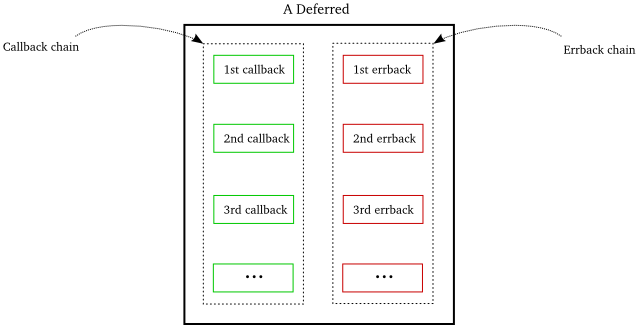
code example
# python3
from twisted.internet.defer import Deferred
def eb(error):
print('OMG NOOO!')
print(error)
def cb(result):
print('WHOA, NICE!')
print(result)
d = Deferred()
d.addCallbacks(cb, eb)
d.callback(42) # fire!
# WHOA, NICE!
# 42code example
# python3
from twisted.internet.defer import Deferred
def eb(error):
print('OMG NOOO!')
print(error)
def cb(result):
print('WHOA, NICE!')
print(result)
d = Deferred()
d.addCallbacks(cb, eb)
d.errback(Exception('BOOM!')) # fire!
# OMG NOOO!
# [Failure instance: Traceback (failure with no frames): <class 'Exception'>: BOOM!
# ]deferred
-
a deferred wraps an Exception into a Failure instance
- it preserves the traceback from the point where that exception was raised
deferred
-
a deferred wraps an Exception into a Failure instance
- it preserves the traceback from the point where that exception was raised
- deferreds are fully synchronous
- no reactor involved, it's plain function calling
deferred
-
a deferred wraps an Exception into a Failure instance
- it preserves the traceback from the point where that exception was raised
- deferreds are fully synchronous
- no reactor involved, it's plain function calling
- you can't fire a deferred twice
- you invoke callback() OR errback(), and just once
DEFERRED

callback chains
- a deferred contains callback/errback pairs (stages), in the order they were added to the deferred
callback chains
- a deferred contains callback/errback pairs (stages), in the order they were added to the deferred
- stage 0: invoked when the deferred is fired
- callback() invoked: stage 0 callback is called
- errback() invoked: stage 0 errback is called
callback chains
- a deferred contains callback/errback pairs (stages), in the order they were added to the deferred
- stage 0: invoked when the deferred is fired
- callback() invoked: stage 0 callback is called
- errback() invoked: stage 0 errback is called
- stage raises OR returns a Failure: the following stage's errback is called with the Failure as the first argument
callback chains
- a deferred contains callback/errback pairs (stages), in the order they were added to the deferred
- stage 0: invoked when the deferred is fired
- callback() invoked: stage 0 callback is called
- errback() invoked: stage 0 errback is called
- stage raises OR returns a Failure: the following stage's errback is called with the Failure as the first argument
- stage succeeds: the following stage's callback is called with the current return value as the first argument
callback chains
- a deferred contains callback/errback pairs (stages), in the order they were added to the deferred
- stage 0: invoked when the deferred is fired
- callback() invoked: stage 0 callback is called
- errback() invoked: stage 0 errback is called
- stage raises OR returns a Failure: the following stage's errback is called with the Failure as the first argument
- stage succeeds: the following stage's callback is called with the current return value as the first argument
- exceptions that go beyond the last stage will be just reported (they won't crash the program)
callback chains
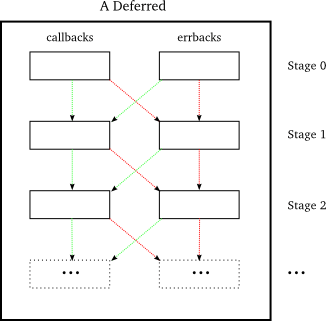
callback chains
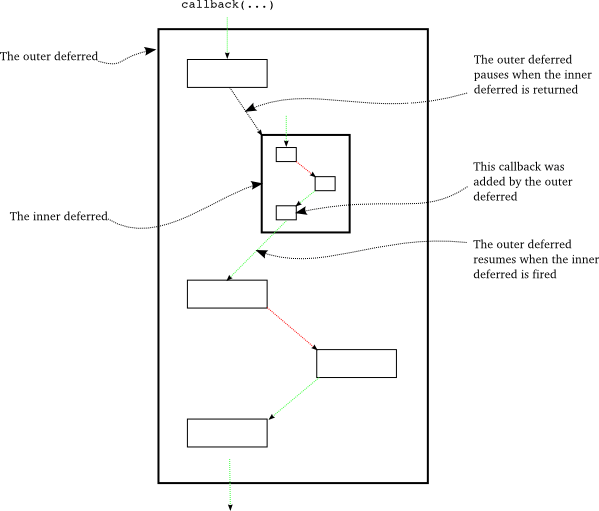
yeah. seriously.

standard reaction

to deferreds
code example
from twisted.internet.defer import Deferred
def stage0_cb(result): print('What is love?'); raise Exception
def stage0_eb(error): print('guh')
def stage1_cb(result): print('blablabla')
def stage1_eb(error): print("Baby don't hurt me"); raise Exception
def stage2_cb(result): print('Eeeeh Macarena!')
def stage2_eb(error): print("Don't hurt me"); return 'No more'
def stage3_cb(result): print(result)
def stage3_eb(error): print("I'm blue dabadi dabada")
d = Deferred()
d.addCallbacks(stage0_cb, stage0_eb)
d.addCallbacks(stage1_cb, stage1_eb)
d.addCallbacks(stage2_cb, stage2_eb)
d.addCallbacks(stage3_cb, stage3_eb)
d.callback(None)
# What is love?
# Baby don't hurt me
# Don't hurt me
# No moreback to basics
back to basics
# python3
from twisted.internet.defer import gatherResults
from twisted.internet import reactor
import treq
_WEBSITES = ('https://www.google.com', 'https://www.amazon.com',
'https://www.facebook.com')
def _print_all(_, homepages):
for website in _WEBSITES: print(homepages[website])
def _store(html, website, homepages):
homepages[website] = html
def get_homepages():
homepages, responses = {}, []
for website in _WEBSITES:
d = treq.get(website)
d.addCallback(treq.content)
d.addCallback(_store, website, homepages)
responses.append(d)
alldone = gatherResults(responses)
alldone.addCallback(_print_all, homepages)
alldone.addCallback(lambda _: reactor.stop())
if __name__ == '__main__':
reactor.callWhenRunning(get_homepages); reactor.run()
a handle to what will be
by returning a deferred, an API is telling us that it's asynchronous, and that the result isn't available yet
it will be, eventually,
and we'll get it as soon as the deferred is fired
you made it this far!

it's a silver bullet!
it's a silver bullet!
No. Forget it. There's no silver bullet.
don'ts
- don't block
- e.g. time.sleep(), synchronous networking
- always rely on Twisted APIs to do time management and I/O
- use Twisted specific 3rd party libraries
don'ts
- don't block
- e.g. time.sleep(), synchronous networking
- always rely on Twisted APIs to do time management and I/O
- use Twisted specific 3rd party libraries
- don't perform CPU bound computations
- e.g. calculations, parsing, image processing
cpu bound
"make it work, make it right, make it fast" -- Kent Beck
- measure, don't guess
- use a profiler, find hot spots, act accordingly
cpu bound
"make it work, make it right, make it fast" -- Kent Beck
- measure, don't guess
- use a profiler, find hot spots, act accordingly
- write idiomatic code
- Burkhard Kloss - Performant Python https://youtu.be/2raXkX0Wi2w
cpu bound
"make it work, make it right, make it fast" -- Kent Beck
- measure, don't guess
- use a profiler, find hot spots, act accordingly
- write idiomatic code
- Burkhard Kloss - Performant Python https://youtu.be/2raXkX0Wi2w
- use PyPy
cpu bound
"make it work, make it right, make it fast" -- Kent Beck
- measure, don't guess
- use a profiler, find hot spots, act accordingly
- write idiomatic code
- Burkhard Kloss - Performant Python https://youtu.be/2raXkX0Wi2w
- use PyPy
- if possible, use libraries implemented as C extensions
cpu bound
"make it work, make it right, make it fast" -- Kent Beck
- measure, don't guess
- use a profiler, find hot spots, act accordingly
- write idiomatic code
- Burkhard Kloss - Performant Python https://youtu.be/2raXkX0Wi2w
- use PyPy
- if possible, use libraries implemented as C extensions
- distribute workload with queues, publishers and workers
cpu bound
"make it work, make it right, make it fast" -- Kent Beck
- measure, don't guess
- use a profiler, find hot spots, act accordingly
- write idiomatic code
- Burkhard Kloss - Performant Python https://youtu.be/2raXkX0Wi2w
- use PyPy
- if possible, use libraries implemented as C extensions
- distribute workload with queues, publishers and workers
- most of all: design for scale
enemy of the state
state shared among threads today
may become
state shared among machines
across a network tomorrow
strive for statelessness
be an enemy of the state
the future: asyncio
- standard library's reactor pattern implementation
- new in Python 3.4
- pluggable event loop!
the future: asyncio
- standard library's reactor pattern implementation
- new in Python 3.4
- pluggable event loop!
- it aims to become the de facto standard
the future: asyncio
- standard library's reactor pattern implementation
- new in Python 3.4
- pluggable event loop!
- it aims to become the de facto standard
- Twisted devs are working on interoperability
- make both event loops interoperable
- address Future/Deferred compatibility
- make the HUGE Twisted protocol codebase work with asyncio (3rd parties included)
the future: asyncio
- standard library's reactor pattern implementation
- new in Python 3.4
- pluggable event loop!
- it aims to become the de facto standard
- Twisted devs are working on interoperability
- make both event loops interoperable
- address Future/Deferred compatibility
- make the HUGE Twisted protocol codebase work with asyncio (3rd parties included)
-
Amber Brown - The Report Of Twisted’s Death
- https://youtu.be/UkkO3_GSR2g
bonus!!!
uvloop
- drop-in replacement for asyncio's event loop
bonus!!!
uvloop
- drop-in replacement for asyncio's event loop
- by Yury Selivanov, core CPython committer
bonus!!!
uvloop
- drop-in replacement for asyncio's event loop
- by Yury Selivanov, core CPython committer
- written in Cython
bonus!!!
uvloop
- drop-in replacement for asyncio's event loop
- by Yury Selivanov, core CPython committer
- written in Cython
- built on top of libuv
- asynchronous I/O engine that powers Node.js

bonus!!!
uvloop
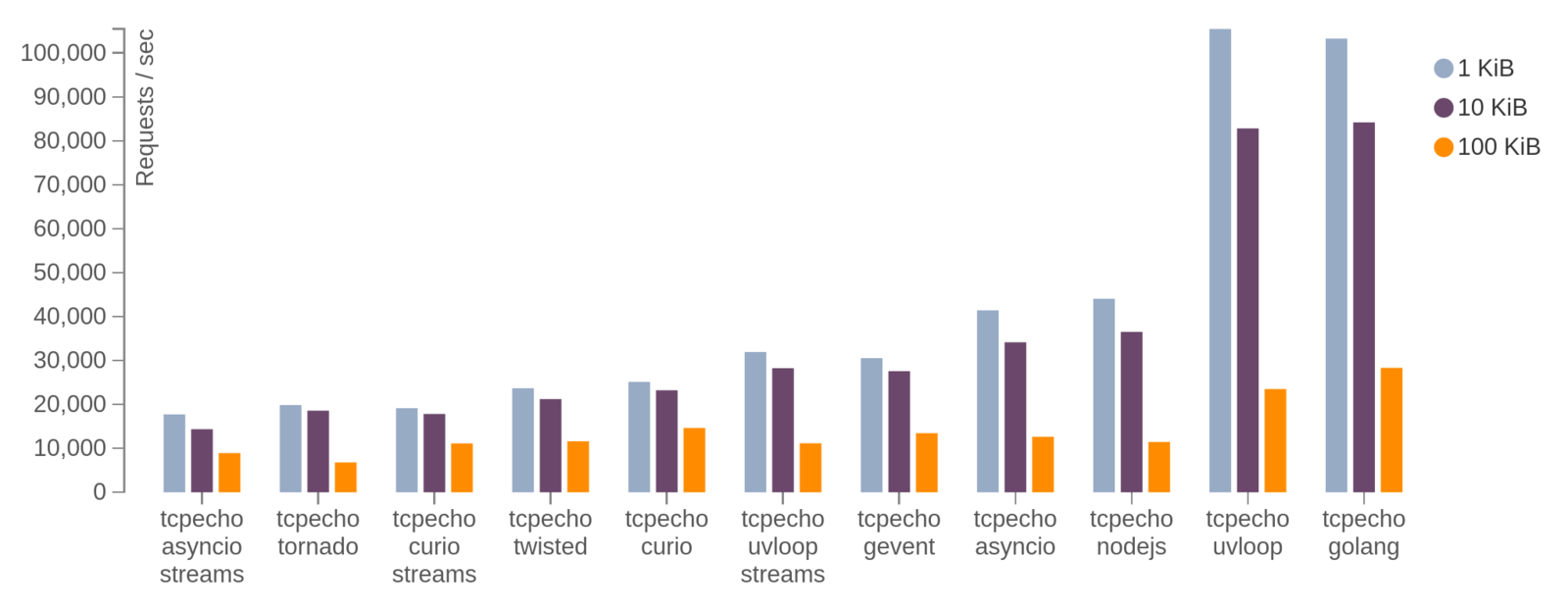
https://magic.io/blog/uvloop-blazing-fast-python-networking
do want moAr!
references and credits
-
Dave Peticolas - Twisted Introduction
- http://krondo.com/an-introduction-to-asynchronous-programming-and-twisted
- http://twistedmatrix.com
- Jessica McKellar, Abe Fettig - Twisted Network Programming Essentials
answers!
or questions.
but mostly, answers.
please.
pssssssst. thank you! <3